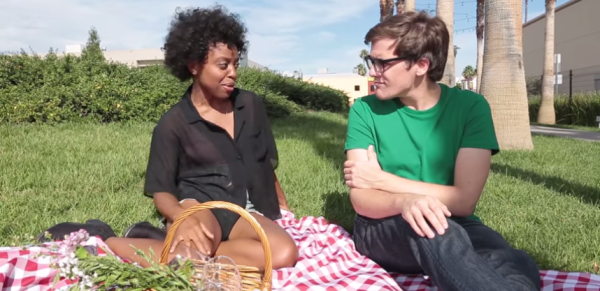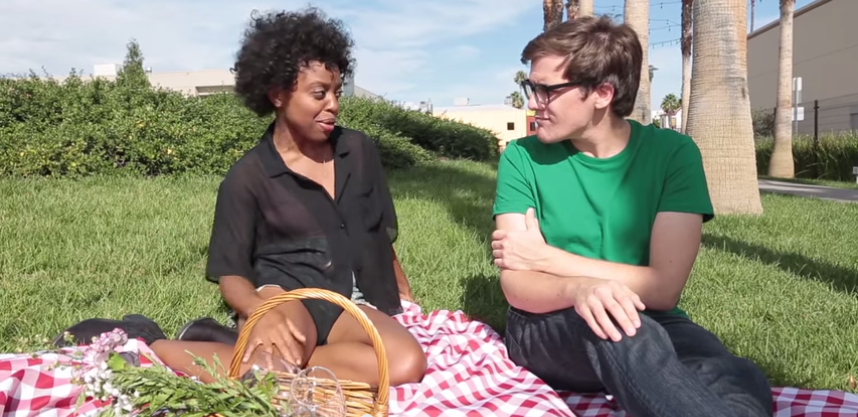
What are you? It sounds like the horrified cry of the blonde starlet in a made-for-TV sci-fi film who has just come face-to-face with the murderous subhuman swamp creature lurking in her family’s faraway beach stead. More often, we hear this question posed by the endlessly curious to those blessed and cursed with racial ambiguity. By now we all know that it’s at least a bit rude to ask someone just what it is they are. We know that white guys are often at a loss for pick-up lines that don’t involve race when they venture into the mystical world of women of color, and that if we talked to them like they did to us things would be, to say the least, confusing. But, why? Why is asking someone what they are worse than asking where they’re from or what their major is? Can’t I just want to know if you care about the environment, if you study film and just how black you really are?
If you have learned to fear the question “What are you?” then you know why.
About two years ago I was cruising home from work on my bike, Frank Ocean playing peacefully in both ear buds. Daylight Saving time had caught me by surprise once again, and I was without a bike light on an early November evening. Waiting for folks just like me, two Stanford sheriffs were parked at the end of Serra Street. One waved me over with his flashlight. As he proceeded to write me a ticket he asked for a bit of personal information: name, age, address, all the important stuff. While I was answering his questions blankly, trying not to roll my eyes at his declaration that he could also write me a ticket for using headphones if he really wanted to, he caught me way off-guard:
“And may I ask what race you identify with?”
Oh God. This question. Not this question. Do I say African-American? Black? Negro? Do I have to keep it PC if I’m just talking about myself? Who am I? What do I call myself? Why does he need to know?
In a cocky outrage, I blurted out: “Human”.
An awkward pause.
“Human’s not a race code I can write on the ticket. Would you like me to say other?”
I agreed to this, even though I was not satisfied. In my refusal to let this officer codify me I had been reduced to a state of otherness, increasing ten-fold the emotional distance between myself and the man in the position of power before me. I was no longer his peer, his citizen or even his fellow human. I was other.
It took me a long time to understand why I was so troubled by the question of my race in this context. I’ve been asked what I am many times, usually by someone interested in more than my genetics. Shouts of “Yo, what are you mixed with?” crashed onto my psyche in the middle of seventh grade computer class. Guys who wondered where I was from and were dissatisfied with the answer “San Diego” searched for something more exotic in my eye-shape and jawline that they found oh-so intriguing. These inquiries made me hyperaware of my appearance. Why didn’t everyone just assume I was black? What makes me look so different? What about me makes me other?
I searched deep for answers to these questions hoping that an explanation for myself laid somewhere in family histories or Ancestry.com. However, as all black people are aware, our documented history withers right around 1865 and census data degenerates into a messy account of slaves per household. No more last names to follow or links to click. These records have vanished, or worse, were never made.
I was determined, however, and the illumination of my identity seemed suspiciously buried in the ethnic history of my most different-looking relative – my maternal grandmother. With light skin and loose dark curls it was obvious to everyone that she was not of the full black identity that she claimed. Frustrated with our incessant questions, she told us one day that she was half-Cherokee. The mystery was solved. I looked different because I was Cherokee, at least in part. It was not clear which members of the family this Cherokee history came from or why we had never heard about them before, but one thing was for certain: I could now explain myself. The Black-Cherokee family narrative persisted for over a decade. My mom, also feeling satisfied with this new identity, took us all on trips to Cherokee reservations, buying me moccasins and dream catchers, trying to reclaim our lost family history. Meanwhile, my grandmother knowingly spent the vacation huddled over a slot machine praying to her ancestors that she would make it big. It wasn’t until a painfully awkward 23andMe result that my mom found out that she was actually almost one-third white.
My identity again seemed shattered and my humanness called into question. How could I ever know who I was if I did not know where I came from? Not knowing of any white family members, I realized that there was and would always be more questions than answers. My grandma couldn’t answer our questions because she didn’t know, or simply didn’t want to know, where this white blood had come from. She claimed a full black heritage and in our selfish need to satisfy our own frail egos we berated her for an explanation for her hair, her skin, and herself.
It was not until running into that cop on Serra Street that I realized how heavy this pressure to identify could be. By asking someone to identify themselves you ask them to put their physical beings into a box that you can understand. Rather than treating each individual as their own beautiful, aromatic blend of ethnicities you demand a list of ingredients to make sure you know what you’re getting when you invest interest into someone. You ask them to give you a backdrop with which you can color all future information. What is it inside of us that compels us to know a person’s racial identity before we know anything else about them?
There are about a thousand and one better ways to get to know a person than to ask where they got that hair or those eyebrows. Asking someone to explain their appearance creates distance between you and them: you identify them as other. You highlight differences rather than similarities, exotic fascination rather than legitimate interest. You obscure true human connection by prioritizing a societal fixation on outward appearance. You demand personal information that may be entangled in complicated family histories, as in the case of my own perplexing ethnic make-up. These stories are often private, reserved by an individual for intimate conversations and not dinner table chats amongst new friends and burgeoning insecurities. Private or not, the assumption that one should be privy to this information is ultimately mistaken. This is the assumption that whites in the Jim Crow South operated on when they demanded of blacks, “show me your papers”. The purpose of these elicitations was to prove to whites that the human in question was who he or she claimed to be: a free black. A freedom that must constantly be verified is no freedom at all.
“I have a dream that my four little children will one day live in a nation where they will not be judged by the color of their skin, but by the content of their character.” – Martin Luther King, Jr.
Cliché? Perhaps. Relevant? Still.
Contact Imani Howard at ihoward ‘at’ stanford.edu
